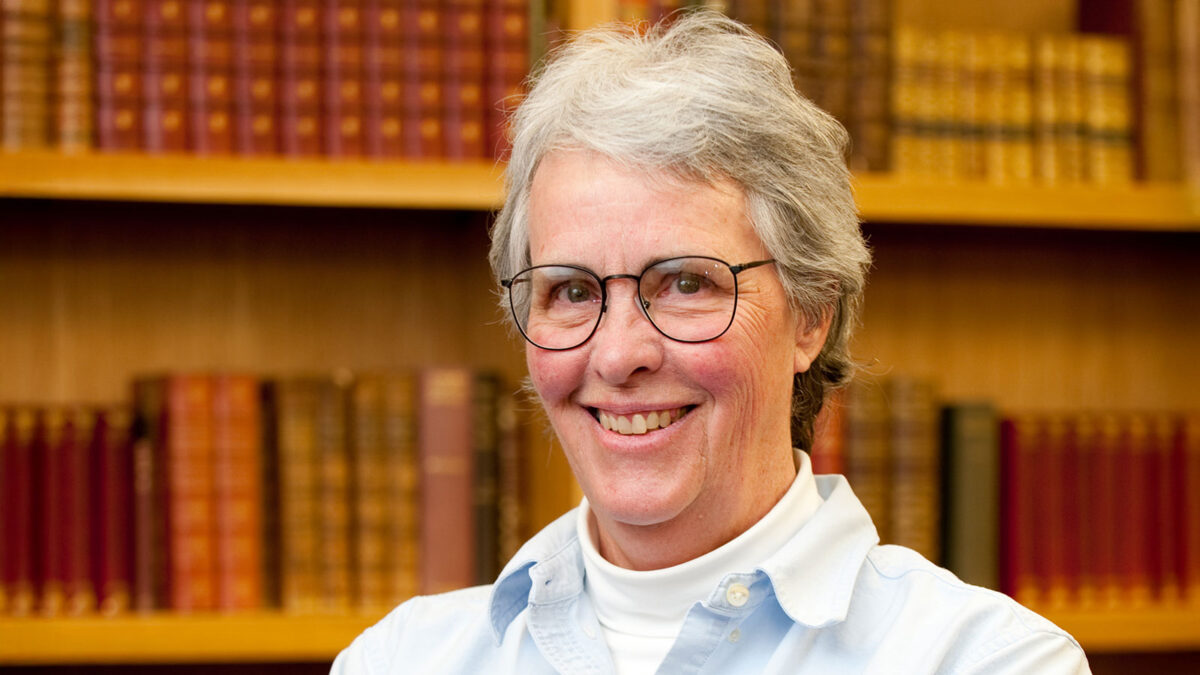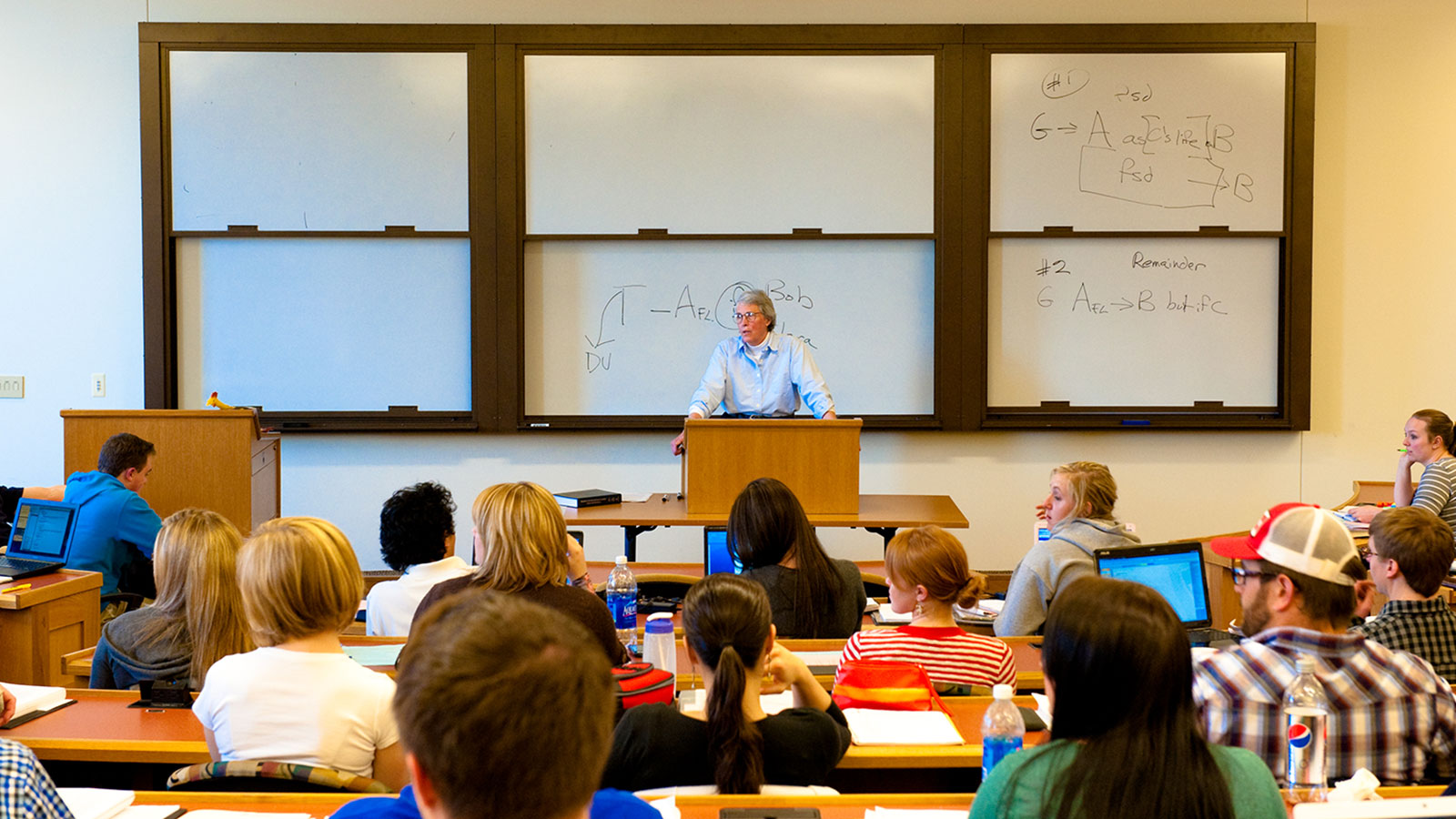
Award of Merit Winner Lucy Marsh Opens Up About Life as a “Ringleader”
December 2025
Download This Article (.pdf)
This year’s Award of Merit winner, University of Denver Law Professor Lucy Marsh, came of age in a dynamic time for women interested in entering the legal field. “I was in law school at about the same time as Justices Ginsberg and O’Connor, but my law school experience was very different,” she recalls. “When I was at Michigan Law School, there were only two women in my section of about 100 students, and only 12 women in the entire class.” Marsh recalls much support and camaraderie in what could have been an intimidating, alienating environment. “In my section, whenever I got called on, all the students in the class would turn around to look—just to be sure that I looked the same way I had the day before. But the entire class was really very friendly and supportive. Whenever I won some sort of award, they celebrated—that I had done so well for our section.”
In her contracts class, the professor seated everyone alphabetically, with the exception of Marsh, who was seated in the back row next to the other woman in the class, whose name began with W. “I really think that prof did that so that the two of us would feel more comfortable. In any case, because it is easier for everyone to hear when a student in the back row is called on, it seemed to me that I got called on almost every day. About 10 years later, when a male classmate who had been seated in the last row stopped by to say hello, he said, ‘Remember how Harris used to strafe the back row?’ So I guess it wasn’t all just in my head.”
While the other female classmate seemed intimidated by the experience and didn’t speak much in class, Marsh took advantage of her visibility—“One of the perks of being one of two women in my section was that when a prof recommended that all 100 of us should read a particular law review article, I just went to the library, sat down, and 10 minutes later whoever had managed to get the copy of the law review first would bring it to my table and ask if I’d seen it yet—saving me all the hassle of scrambling for the article.”
More important, she drew on her natural leadership abilities, easily asserting herself in advocating for changes to the student experience at the University of Michigan in Ann Arbor, where she went to law school. “After my first year of law school, I volunteered in the Denver Legal Aid Office, which worked with DU law students. When I told my Michigan classmates about that experience as we were starting our second year of law school, a bunch of them decided that they wanted to get the same experience at Michigan. So, a friend and I wrote a brief to the Michigan Supreme Court, convincing them to adopt a student practice rule, which we patterned after the Colorado rule, allowing Michigan law students to represent clients through a legal aid project. Then we got the school to permit us to set up the first legal aid clinic Michigan had ever had.”
Marsh didn’t let herself get overwhelmed by all the details that setting up such a program would entail. Instead, she addressed each issue as it arose. First was the issue of office space—from her experience in Denver, she knew they would need to have their offices somewhere off-campus, in a location where the low-income people in Ann Arbor would feel comfortable. “One student talked a merchant into allowing us to use some empty floor space—if we would clean the place. So, we had a cleaning party with hoses borrowed from one of my profs. Not knowing that I was supposed to be frightened or intimidated by my fellow students, I became a ringleader and thoroughly enjoyed law school.” Later that same pragmatic confidence saw Marsh cold-calling Ann Arbor attorneys during much of her senior year, getting them to volunteer to check student work.
Leadership Foundations
“I think that there are a bunch of reasons why I wasn’t frightened at law school. First, both of my parents always gave all of us a tremendous sense of confidence—that we could try almost anything and not be afraid to fail every so often. Growing up, we had lots of sports equipment in the backyard and a skating rink open to all the neighborhood kids during the winter. We climbed lots of the fourteeners together as a family. When I was at Smith College, right before going to law school, women always took the lead, of course. I was house president, president of the Smith-Amherst Orchestra, and treasurer of the Athletic Association. I actually had to petition to be able to keep all those jobs—and the deciding factor seemed to be that when I was asked how I dealt with stress, I said I just went for a bike ride. So, I’ve been a bit of a leader all my life.”
Despite such encouragement from her family, Marsh admits that her father, Thompson Marsh, who taught at DU law school for 60 years, wasn’t initially enthusiastic for any of his four daughters to study law. “He had seen how very tough it was for women law school grads, and he didn’t want us to have to go through that. But he supported me wholeheartedly when I decided to go to law school.”
Lawyer Turned Professor
Marsh graduated and immediately got a job as a lawyer, joining the largest firm in Lakeville, Connecticut, where her then-husband was teaching at Hotchkiss Prep School. Marsh was one of three lawyers in the firm. Soon after moving back to Denver, she started teaching, carrying on the family tradition. Says Marsh, “For a while, three of the six people in my immediate family were teaching law. What does that say about DNA?”

Marsh quickly learned that teaching is very different from the actual practice of law. She explains, “At the DA’s Office, I was always dealing with someone on the other side, and in private practice, I was always working with clients who had their own ideas. That kept me open to new ideas and new approaches all the time. But when teaching, the professor selects what materials are to be covered, in what depth, at what time. And it is easy for professors to start feeling like they have all the answers. Students always come up with some good ideas—but there just isn’t the same equality that there is with lawyers on opposing sides.”
This dichotomy was most apparent when Marsh was both teaching full-time and working part-time at the District Attorney’s Office. Chief deputies meetings that she sat in on would see “the wonderful DA Dale Tooley tossing out an issue, and we would all chip in ideas about an appropriate answer, and no one felt threatened or ignored. At faculty meetings, by contrast, each prof usually seemed to feel that he or she had the only correct answer. I remember one time when one prof talked for what seemed like 20 minutes, explaining why he didn’t know how he was going to vote on a particular point. The rough and tumble of practice keeps everyone humble—to some extent.”
Ethos of Service
Marsh also holds a very service-oriented approach to life, one that she ascribes to the influence of her parents. “When I was very young, I remember hearing that my mother, a member of the Denver Symphony, had persuaded the other members of the symphony to boycott a hotel that was unwilling to accept one of the touring musicians who happened to be Black. Both of my parents were always willing to stand up for people who were not being treated fairly. And both really got along very well with other people from many different walks of life.”
This ethos of service is reflected in two of her major contributions to the community, the Wills Lab and the Tribal Wills Project. When she was on the board of what was then Denver Legal Aid, Jon Asher and the other board members convinced her to establish the Wills Lab, which for the last 40 years has provided free wills and related documents to low-income people in the Denver area. The Tribal Wills project was started “because John Roach, then the fiduciary trust officer for the Southwest Region, sent a letter to all the law schools in the area, asking if some students might help write wills that were desperately needed by tribal members. I was the only one—from any law school—who answered. And we have now set up a very successful program providing free wills and related documents to tribal members in eight different states so far—Arizona, California, Colorado, Minnesota, Montana, New Mexico, South Dakota, and Utah—always at the invitation of the tribe or nation involved. All of this with the wonderful assistance of volunteer Colorado attorneys, and volunteer attorneys and notaries in each of the other states where we have worked. I’ve become admitted on motion in Arizona, New Mexico, and Utah, just to help out with Tribal Wills since we work in the Four Corners area so often.”
Family Matters
When she is not teaching or helping underserved communities, Marsh revels in her family: “I’ve got a great family. One of my sons, Neil, is living in Faro, Yukon Territory, Canada, and serving on the town council and the volunteer fire department—and having a great time enjoying the outdoors. My other son, Carl, is living in San Diego, and has a company that sells a special kind of ink in 22 countries. He’s the father of my two wonderful grandkids, Anneke and Joshua.”
Looking ahead, Professor Marsh hopes to continue teaching and working with the Tribal Wills Project and the Wills Lab for a very long time. “After all,” she explains, “by the fall of 2027, there will have been at least one member of my family teaching at DU law school for 100 years. My father was the first-full time law professor ever hired by DU—he started teaching at DU immediately after his graduation from DU Law in 1927!”
Conclusion
As she celebrates nearly a century of family legacy at DU, the CBA’s newest Award of Merit recipient is a prime example of what can be achieved though commitment, confidence, and courage. Her story reminds us that making change often starts with believing that you can—and then simply stepping forward.


